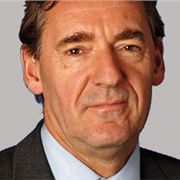THEY are separated by a de-militarised zone known as the East Lancs Road. In a Battle of Edge Hill they’d build barricades with cobbles at both ends. In a word, Liverpool and Manchester are rivals.
The rivalry goes back a long way – in the American Civil War, Liverpool stuck up for the Confederates. Manchester sided with the Yankees, and has the statue to prove it.
 Jim O'NeillSo a suggestion from an economic guru will come as a shock – Manchester and Liverpool should merge. “Manpool”, with a population approaching 6m, would be big and powerful enough to compete with London and other mega cities around the world.
Jim O'NeillSo a suggestion from an economic guru will come as a shock – Manchester and Liverpool should merge. “Manpool”, with a population approaching 6m, would be big and powerful enough to compete with London and other mega cities around the world.
The idea comes as Liverpool and its five neighbours suffer a bout of tunnel vision over the name for a new super authority to fly for the flag for the Liverpool City Region.
Instead of simply using a world-brand name such as, err, Liverpool, the Mersey cousins want to be known as Haltonknowsleyliverpoolseftonst
helenswirralcombinedauthoritysillybuggersgogogoch.
JAnd while the prospects of Liverpudlian and Mancunian politicians happily sharing the power base may seem as likely as the Ship Canal freezing over, the prospects of us all becoming Manpolitans makes economic sense, say promoters of the idea.
 Sir Richard LeeseThe notion of a mega city stretching from the Mersey to the Irwell emerged at a conference in Manchester, organised by the City Growth Commission.
Sir Richard LeeseThe notion of a mega city stretching from the Mersey to the Irwell emerged at a conference in Manchester, organised by the City Growth Commission.
The commission, chaired by macro-economist Jim O’Neill, is an independent inquiry aimed at trying to boost urban growth in the UK’s major cities. It is running for just 12 months and plans to publish recommendations in October to influence the political debate in the build-up to the 2015 General Election.
The Manchester pow-wow was the first hearing during which evidence is being sought at gatherings in a number of cities around the country.
O’Neill, who came up with the acronym BRIC to highlight the fast emerging world economics of Brazil, Russia, India and China, has devoted more than three decades examining the changing state of the world’s economies. Now he has turned his attention to how economic growth in the UK can be boosted.
London and the South East dominate the UK’s economic performance, whereas in China, Germany and the US, large urban areas help fuel their economic strengths.
The City Growth Commission believes if more urban areas showed stronger growth, it would help boost the national economy’s rate of growth. The answer could be concentrating efforts on 15 of the largest metro regions, based on the reality from around the world showing the biggest urban areas matter most when it comes to unleashing a step-change in economic activity.
In that respect Greater Manchester just isn’t big enough, prompting O’Neill to pose the prospect at the Manchester hearing of thinking the unthinkable: the notion of "ManPool", where Liverpool and Manchester bring together their populations and resources to create a metropolis in the north.
 Joe Anderson OBE It is easy to see where O’Neill is coming from when metro areas across the world are examined. Even London with its 14m inhabitants ranks only 18th place, Tokyo topping the league table with around 33m people.
Joe Anderson OBE It is easy to see where O’Neill is coming from when metro areas across the world are examined. Even London with its 14m inhabitants ranks only 18th place, Tokyo topping the league table with around 33m people.
Britain’s second biggest metro sprawl, Birmingham, with about 3.8m, is virtually a village compared to dozens of metro city areas around the world.
Is the idea of mega city regions in the UK is a step too far, even though it makes economic sense? Who would be at the helm? Joe Anderson or Sir Richard Leese?
Maybe there's an alternative suggestion. How about reviving the NWDA (North West Development Agency)?











